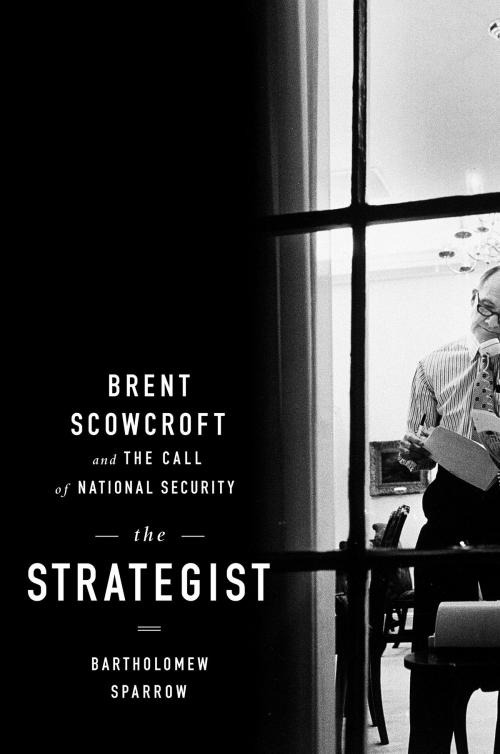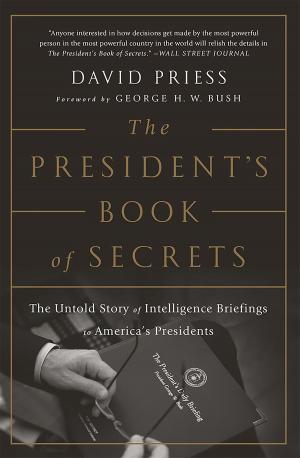The Strategist
Brent Scowcroft and the Call of National Security
Nonfiction, Social & Cultural Studies, Political Science, International, International Security, International Relations, Biography & Memoir, Political| Author: | Bartholomew Sparrow | ISBN: | 9781586489649 |
| Publisher: | PublicAffairs | Publication: | January 27, 2015 |
| Imprint: | PublicAffairs | Language: | English |
| Author: | Bartholomew Sparrow |
| ISBN: | 9781586489649 |
| Publisher: | PublicAffairs |
| Publication: | January 27, 2015 |
| Imprint: | PublicAffairs |
| Language: | English |
Based on the full cooperation of the subject-with no restraining conditions-The Strategist provides an in-depth portrait of a man whose career has been intimately linked to the great transformations in U.S. foreign policy, from the last third of the Cold War, to September 11, 2001, and up to the present. Bartholomew Sparrow brings color and focus to the complex and often secretive nature of U.S. foreign policy and strategic adjustments-an intellectual battlefield on which ideas and worldviews clash, in which economics, politics, and strategic concerns intertwine, and in which private citizens and non-office holders may exert as much influence as highly visible Cabinet officials.
Among the most important foreign policy minds of the 20th and early 21st centuries, Brent Scowcroft is also among the least well-known or understood. In a now-famous August 2002 Wall Street Journal op-ed titled Don't Attack Saddam Hussein,” Brent Scowcroft, who had been national security advisor under President George H. W. Bush, went to war himself, in a sense, with his closest and longest-standing friends. He noted the scant evidence that tied the Iraqi government to terrorist organizations. He warned that an invasion and occupation of Iraq would be costly and potentially disastrous for a variety of carefully considered reasons. He recommended that the Bush administration work with the U.N. Security Council and wait for definitive proof of Saddam's wrongdoing before taking action.
The essay at once made Scowcroft the most outspoken and most credible critic of the Bush administration's plans for war and immediately generated national controversy. It provoked a sudden, deep split in the Republican Party over the plans for war. Vice President Cheney, National Security Advisor Rice, Defense Secretary Rumsfeld, and President George W. Bush all vigorously reaffirmed their cause and their course of action, and the media and American public opinion soon fell in line.
Clearly, Scowcroft, 84, continues to participate in the most central and important debates over U.S. foreign policy and national security. He has been a leading architect of U.S. foreign policy and grand strategy for almost a half-century, and though long out of office, still gives speeches, makes media appearances, and leads tasks forces and commissions. He is a rare creature, one of the few wise men” of the nation's capital: someone who is regularly consulted by top government officials in Democratic and Republican administrations, ranking members of the House and Senate from both sides of the aisle, and the country's leading foreign-policy journalists. As recently as April 2009, Scowcroft co-chaired an extensive Council of Foreign Relations study of the U.S. nuclear weapons policy. More than anyone else, he stands at the center of the United States' foreign policy establishment. Most significantly, Scowcroft is trusted-a scarce and typically fleeting quality in Washington-and has been for four decades.
The unprecedented insights into the man and his career Sparrow offers in The Strategist are vital to anyone who wishes to understand America's changing role in the world.
Based on the full cooperation of the subject-with no restraining conditions-The Strategist provides an in-depth portrait of a man whose career has been intimately linked to the great transformations in U.S. foreign policy, from the last third of the Cold War, to September 11, 2001, and up to the present. Bartholomew Sparrow brings color and focus to the complex and often secretive nature of U.S. foreign policy and strategic adjustments-an intellectual battlefield on which ideas and worldviews clash, in which economics, politics, and strategic concerns intertwine, and in which private citizens and non-office holders may exert as much influence as highly visible Cabinet officials.
Among the most important foreign policy minds of the 20th and early 21st centuries, Brent Scowcroft is also among the least well-known or understood. In a now-famous August 2002 Wall Street Journal op-ed titled Don't Attack Saddam Hussein,” Brent Scowcroft, who had been national security advisor under President George H. W. Bush, went to war himself, in a sense, with his closest and longest-standing friends. He noted the scant evidence that tied the Iraqi government to terrorist organizations. He warned that an invasion and occupation of Iraq would be costly and potentially disastrous for a variety of carefully considered reasons. He recommended that the Bush administration work with the U.N. Security Council and wait for definitive proof of Saddam's wrongdoing before taking action.
The essay at once made Scowcroft the most outspoken and most credible critic of the Bush administration's plans for war and immediately generated national controversy. It provoked a sudden, deep split in the Republican Party over the plans for war. Vice President Cheney, National Security Advisor Rice, Defense Secretary Rumsfeld, and President George W. Bush all vigorously reaffirmed their cause and their course of action, and the media and American public opinion soon fell in line.
Clearly, Scowcroft, 84, continues to participate in the most central and important debates over U.S. foreign policy and national security. He has been a leading architect of U.S. foreign policy and grand strategy for almost a half-century, and though long out of office, still gives speeches, makes media appearances, and leads tasks forces and commissions. He is a rare creature, one of the few wise men” of the nation's capital: someone who is regularly consulted by top government officials in Democratic and Republican administrations, ranking members of the House and Senate from both sides of the aisle, and the country's leading foreign-policy journalists. As recently as April 2009, Scowcroft co-chaired an extensive Council of Foreign Relations study of the U.S. nuclear weapons policy. More than anyone else, he stands at the center of the United States' foreign policy establishment. Most significantly, Scowcroft is trusted-a scarce and typically fleeting quality in Washington-and has been for four decades.
The unprecedented insights into the man and his career Sparrow offers in The Strategist are vital to anyone who wishes to understand America's changing role in the world.















